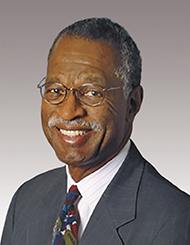Service Award
 Dr. Howard L. Fuller, Grad ’85
Dr. Howard L. Fuller, Grad ’85
Milwaukee, Wis.
From his early days as a grassroots activist, Dr. Howard Fuller demonstrated his skill as a leader—and his instinctive ability to develop the leadership potential in others. His capacity to find and nurture this potential in people catalyzed the success of the many movements he has initiated.
As an educator and civil rights activist, Dr. Howard Fuller built a reputation with his passion and aptitude for mobilization and community organization.
"My work is what defines me," he says. "My work is to make a difference for people who are forgotten or sometimes shunned in our society.”
Howard's work began in the 1960s while attending Case Western Reserve University. There, he participated in his first protest, an experience that triggered a transformation and shaped his philosophies as an activist. He believed his responsibility was to organize people to help them gain greater control over their lives.
Howard began motivating small groups into impactful movements, and over a period of time, he developed organizations that demanded attention to equality. At different points in his life and career, his activism focused on race, poverty, and class division. Education, however, has always been the common thread in his work and philosophies.
He joined Marquette in 1977 when he began working with the Education Opportunity Program. Shortly thereafter, he enrolled as a student to pursue his Ph.D. in sociological foundations of education. He left Marquette in 1982 to become a member of Wisconsin Governor Tony Earl’s cabinet.
Howard returned to Marquette, ensuring a lasting legacy at the university when he founded the Institute for the Transformation of Learning in 1995. The institute was built to provide quality educational options for students of low-income families. Thanks in part to Howard's leadership, the Institute has been awarded millions of dollars in grants from local and national foundations for working to reform K-12 education.
Howard has led a range of other educational initiatives, starting with his founding of the Malcolm X Liberation University in 1969 and extending through his tenure as superintendent of Milwaukee Public Schools from 1991 to 1995. In 2004, he co-founded the Dr. Howard Fuller Collegiate Academy, where he still serves as board chair emeritus.
At 82, he continues to advocate for educational reform today. "As long as I am able, I plan to continue to be engaged in efforts to make life better for the disinherited," he says.
Howard's life and career are sometimes described as controversial, but his courage has been a powerful, driving force of change. Howard believes strongly that our choices influence our impact, and he knows the values Marquette instills in its students empower their ability to be the difference. Throughout his time on campus, Howard was regarded as a mentor and students frequently turned to him to support their advocacy efforts.
With this in mind, Howard encouraged his daughter to attend Marquette. "I owe this university more than I can ever repay," says Howard. "Marquette not only gave me my Ph.D.; it allowed me to pursue my life's work for 25 years."
Howard is honored to be recognized with the Marquette Service Award. "It means that the University values my work," he says. "And in valuing my work, it means that Marquette understands the importance of changing this society to make a difference for the disinherited."
- Howard's favorite quote comes from escaped slave and prominent Black Abolitionist Frederick Douglass: "If there is no struggle, there is no progress." This also is the title of his memoir, No Struggle, No Progress: A Warrior’s Life from Black Power to Education Reform, which was published by Marquette University Press in 2014.
Leave a congratulatory message for Dr. Fuller!